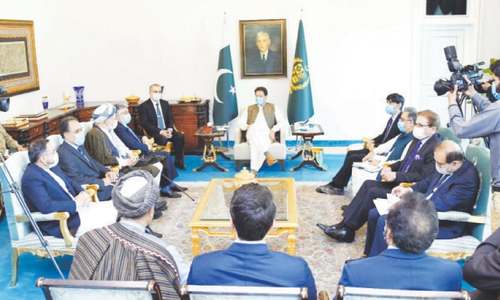OVER two weeks since they took Kabul, the question of international recognition still confronts the Afghan Taliban. Whether or not the international community recognises the hard-line movement as a legitimate government will make a huge difference where foreign investment, expertise and aid are concerned.
The last time the Taliban were in power only three states recognised their rule: Pakistan, Saudi Arabia and the UAE. This time around, if they want to gain the recognition of the global community the Taliban will have to earn the world’s trust, while foreign states must also act in accordance with ground realities and deal with the Taliban for the stability of Afghanistan. Currently, both the EU and the UK — major aid donors — are reluctant to deal with the Taliban, though in the same breath they also acknowledge that there are few alternatives to doing so.
Read: Taliban preparing to reveal new Afghan government amid economic turmoil
While in Islamabad recently, the UK’s foreign secretary said “we do not want to recognise the Taliban as a government, but we do see the importance of engaging ... with them”. The EU has also said that “we will have to engage with the new government in Afghanistan” in order to support the Afghan people.
Basically, the Western bloc has two major concerns: they want guarantees from the Taliban that the movement will respect fundamental rights, including women’s rights, and that the new rulers will not allow Afghanistan to become a hotbed for international terrorist movements. Considering the Taliban’s last stint in power, these are valid concerns. However, building trust works both ways. The Taliban must prove through their actions that they will form an inclusive set-up that respects human rights, and religious and ethnic differences while ensuring that Afghan soil is not used for terrorism.
For their part, the Western states — that are particularly concerned about Afghan stability because they do not want a fresh wave of migrants headed to their shores — must engage with the Taliban to the extent possible, as isolating the group may drive them, once again, into the arms of even more hard-line actors. As Foreign Minister Shah Mahmood Qureshi told his British counterpart, the Taliban are the “new reality” in Kabul.
It is hoped that the international community reaches a consensus soon on recognising the Taliban. What is clear is that the welfare of the people of Afghanistan must top the agenda. They must not be left in the lurch at this difficult time simply because some states don’t like the way the Taliban are running the show. Moreover, the world community has no qualms about dealing with Saudi Arabia — the bastion of religious conservatism — so if the Taliban truly commit themselves to inclusive rule, there should be no problem with recognising them. The Western bloc must not insist that Afghanistan be remade in their image, as the country has its own cultural and religious sensitivities.
Published in Dawn, September 5th, 2021
















































